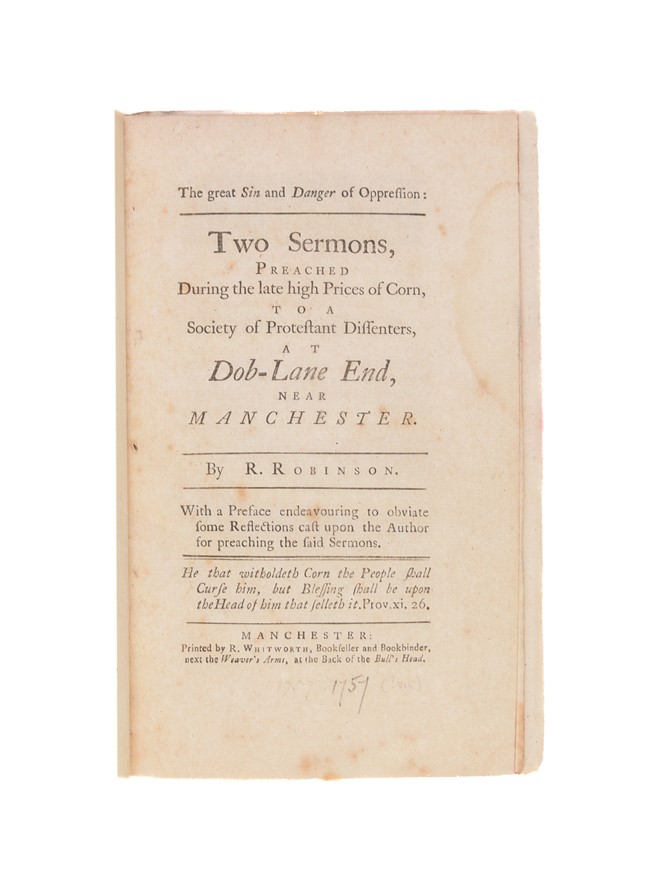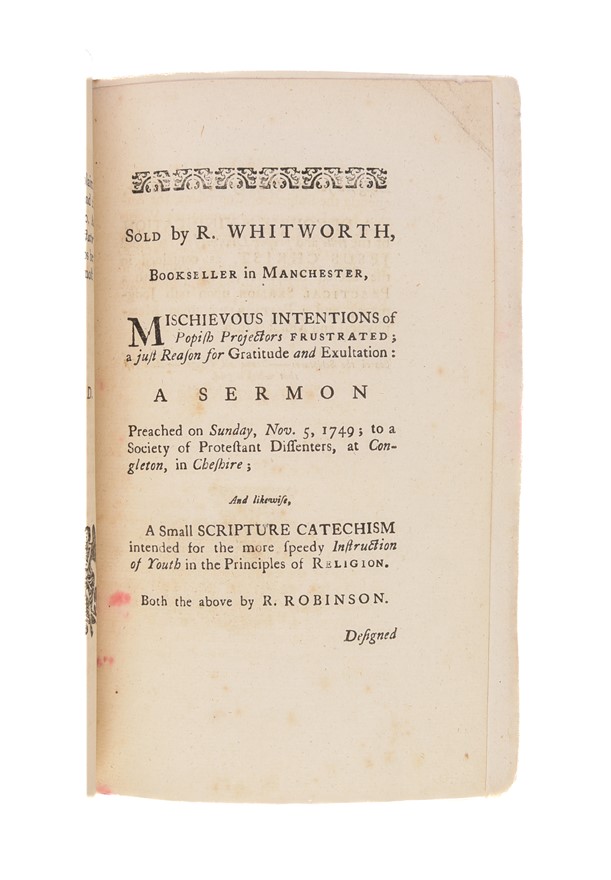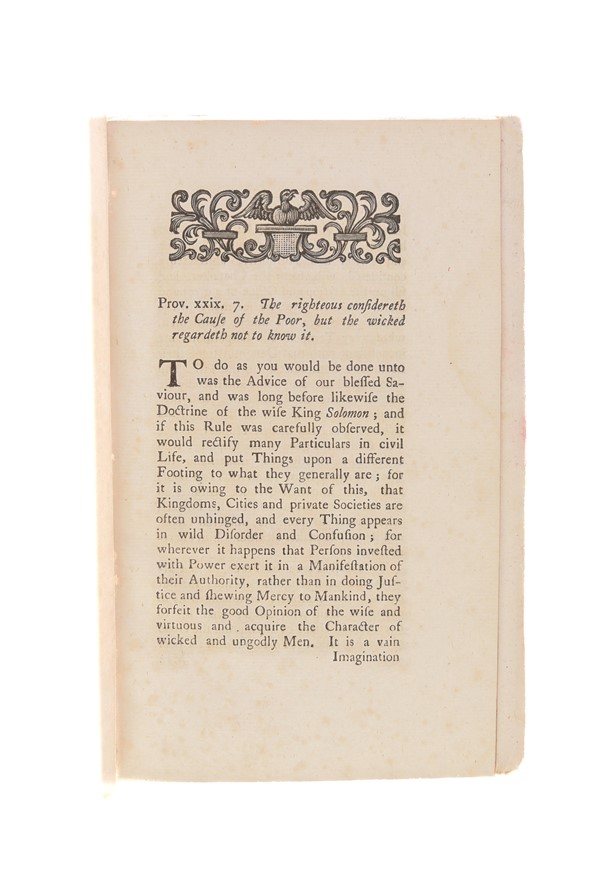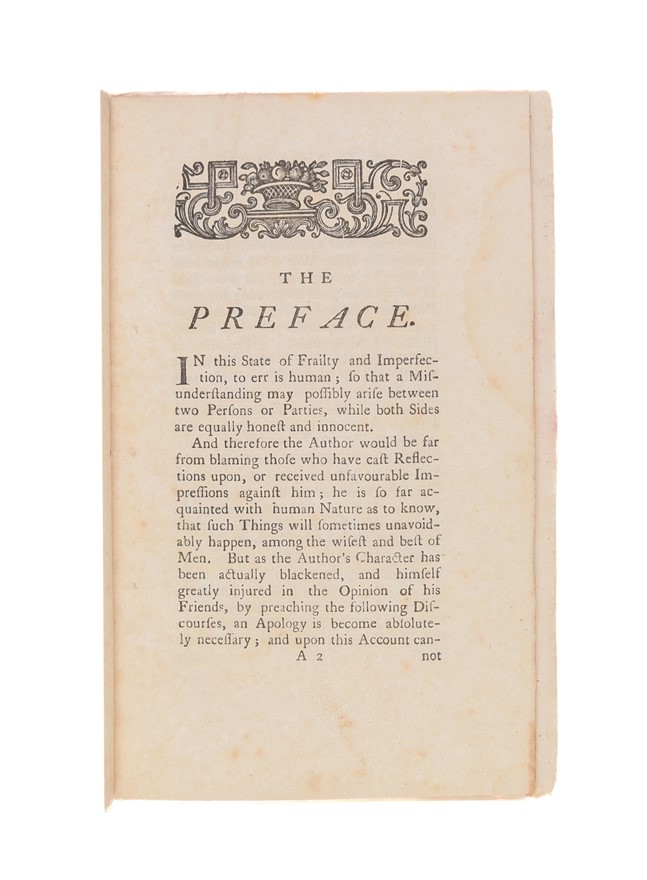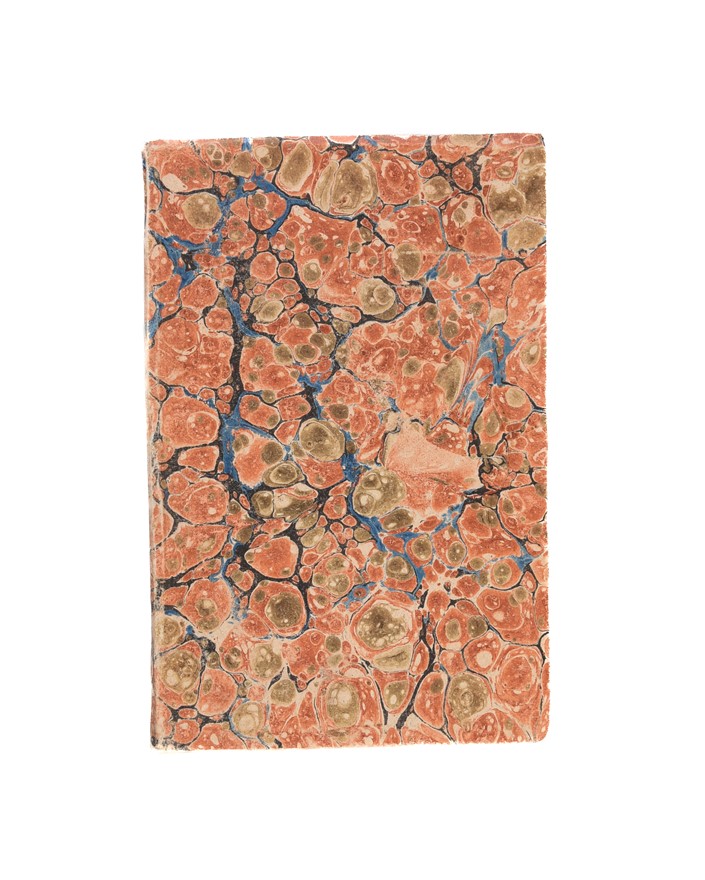The great sin and danger of oppression: Two Sermons, Preached During the late high Prices of Corn, to a Society of Protestant Dissenters, at Dob-Lane End, near Manchester.
ROBINSON Robert ([1757])
£950.00 [First Edition]
Please contact us in advance if you would like to view this book at our Curzon Street shop.
TWO ANGRY DISSENTING SERMONS ON "WITHHOLDING CORN IN A TIME OF SCARCITY"
With a Preface endeavouring to obviate some Reflections cast upon the Author for preaching the said Sermons.
First Edition. 8vo (206 x 125mm). 66, [2, advertisement]pp. Lightly foxed in places throughout, small semi-circular water mark to the blank fore-margins, pink ink spotting to the last couple of leaves. Modern marbled paper wrappers (a little crumpled at the edges).
Manchester: by R. Whitworth,
Rare. ESTC records BL, Congregational Library, Chetham's Library and John Rylands only - no copies recorded in the US.
Two rare and powerful sermons on the horrors of poverty and hunger in Manchester by the fiery dissenting minister Robert Robinson.
Robert Robinson (1726/7-1791) was educated in London and was later minister at dissenting chapels in Cheshire. Notorious for his "uncertain temper", Robinson is said to have had a beggar whipped by the constable of Dukinfield which led to him being ejected and appointed as minister at Dob Lane Chapel in Failsworth near Manchester.
"At first he carried out his duties conscientiously. The chapel accounts record that the sacrament was regularly administered at monthly intervals between April and November each year until November 1764, when records cease. However, his political views and his orthodox Trinitarian theology, as well as his short temper, appear to have alienated his congregation. In 1774 members of his congregation sought legal advice on the possibility of dismissing him for refusal to baptize and administer the sacrament. The root of the dispute seems to have been financial. Prior to Robinson's incumbency, fees and collections were donated to the poor. Robinson, however, used the fees to repair his house, only grudgingly allowing small donations to the poor. Legal opinion was that, although Robinson had 'a mean and avaricious temper which he shews on all occasions', he had committed no moral offence. Robinson retaliated by locking out his congregation" (ODNB).
In the preface to the two sermons printed here, Robinson explains that his character (somewhat justifiably, if the above is to be believed) has been "blackened, and...injured" by attacks on him. He states:
"...there are some dishonest People in every branch of Business, Persons who have not the Fear of God before their Eyes; who pay no Regard to Reason, Duty, Conscience, Gratitude or Obedience; who will not scruple to violate the Laws of God and their Country, in Order to carry on and promote their own secular Interest and Advantage..."
"The Cornfactors, &c. we may suppose, are not such a righteous Set of People, as to have no Unrighteousness among them; for when they have people at a Pinch, some of them, I apprehend, will squeeze and screw up their Neighbours, as is common among unfair Dealers in every other Profession"
"In places at a Distance, I have been told that Flour was dear but good; in Manchester it was generally allow'd there was both good and bad; be that as it will, I have seen Meal or Flour in the Country adulterated beyond all Description; for indeed I can scarce tell what it was, only I was told it was intended to be Bread for the poor..."
The adulteration of bread in Manchester during the food shortages of 1757 led to rioting and resulted in the Making of Bread Act which protected the making of bread and punished those who adulterated it.
The two sermons are taken from Proverbs: The righteous considereth the Cause of the Poor, but the wicked regardeth not to know it" (xxxix, 7) and He that oppresseth the poor reproacheth his Maker but be that honoureth him hath Mercy on the poor (xiv, 31). Robinson writes in the second sermon:
"Every Man in Distress should not be treated as a Beggar; nor every charitable Action performed with the Air of giving an Alms. To assist People of Parts and Education, especially those who have been in good Circumstances, in a rough and overbearing Manner, is very unbecoming. Use every Person in a Manner suitable to his Condition... (p.62)
At the end of the text is an advertisement for two other works by Robinson published by Whitworth and a further work "designed for the Press". According to the ODNB Robinson, after resigning from his position at Dob Lane Chapel, is said to have worked for Whitworth.
Stock Code: 247048
